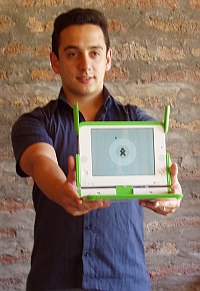I have often told people that the only stupid question is the one you didn't ask, but it has been borne in upon me that I am wrong. There is another kind of stupid question, the kind that can't possibly result in useful information no matter what answer you get. We have a clear case of that now in a study that claims to tell us that the Asus Eee netbook is better for developing countries than the OLPC XO.
Firstly, here is a bit of the way the result is presented to the public over at Tech Radar
Research by African universities looking at the top laptop and desktops for use in developing countries has shown that Asus' Eee PC netbook wins out hands down over the One Laptop per Child's XO laptop.
And a follow-on comment by Ugomatic, the author of the study:
As the report noted, the OLPC is indeed the least power consuming solution: it uses approximately half the power consumed by the Asus Eee PC. However, it features the slowest processor of all tested solutions, which results in higher overall power consumption when trying to complete a set of tasks. In addition to this, all teams testing the OLPC found a number of limitations with the software provided with the machine...
Well, duh. It comes with education software, not an office productivity suite. Anyway, this is what I commented on the site. You will see that the essence of my complaint is that the study "carried out in conjunction with three African Universities and the ZDNet technical labs in the UK," asked a stupid question. In addition, I propose some questions that are much better for the purpose, as I see it.
Asking the Wrong Question
The OLPC XO loses out in a category it was not designed for, and is completely unsuited for, due to the keyboard if nothing else. Why trumpet the results of a meaningless study in this completely inappropriate and meaningless way?
This study claims to determine which computers are best for developing countries, as though there were only one category of computer users in developing countries, that is, as though schoolchildren don't matter. Its findings thus have nothing to do with the XO's intended use, and are an insult to all children, teachers, and parents in every developing country.
Ugomatic: Why do such a study in the first place, with such ill-defined aims? I have often observed that the answers you get in evaluating the XO depend sensitively on the questions you ask. If you look for speed, capacity, throughput in business or technical computing, then of course the XO fails in comparison with conventional netbooks. But who would even think of using a child's computer with a child's keyboard for such purposes?
And what does throughput have to do with the schools? XOs will commonly be used for reading static books and Web pages. Can you read faster on an Eee? If you ask not just about the power consumption and processor speeds as cost factors, but consider mission-critical factors for education, nothing comes close to an XO:
- the use of Free Software tailored for children, which children have the legal right to adapt to their own languages
- ruggedness to reduce repair and replacement costs
- environmental friendliness (no heavy metals in the battery, no mercury in the screen backlight) to reduce disposal costs
- daylight readable, higher resolution, lower cost screen
Also, it is pointless to claim that a computer is inferior because it lacks a particular piece of software. In fact, you can run a spreadsheet on the XO, and a Sugar-specific spreadsheet, SocialCalc, is in development.
There are more than a million XOs in use by children, and more than a million more on order. There are also Intel Classmate and Encore Mobilis computers, among others, in use in one-to-one computing in the schools of various countries. Sugar Labs has ported Sugar to Caixa Mágica Linux for the Classmate, as used in Venezuela, and is porting Sugar to the ARM processor used in the Mobilis.
That will give us more than 3 million units by the end of the year. If anyone would care to do a study that does focus on education, we can soon have real answers to the real question.
Wrong Questions Beget Bad Answers
One of the most important skills in real life is to be able to ask useful questions. The more useful, the more rare and important. In the extreme case, we get scientists who ask questions that many others consider silly, but that lead to new science, and questions that create a new form of politics. The canonical Good Question is, "Mommy, why isn't the Emperor wearing any clothes?" Unfortunately, that is the kind of question that society at large is most concerned should not be asked, much less answered.
Bad questions come in all kinds:
- You can assume the conclusion: "Have you stopped beating your wife?"
- You can ignore the evidence: "Sentence first, verdict after!"
- You can shoot the messenger, as in the Ibsen play, An Enemy of the People.
- You can present a false dichotomy: "Phonics or Whole Word, which is your choice?" (English requires both. Compare cat bat hat with rough cough through .)
Here we have a lumping together of distinct cases, not just a simple dichotomy. But the principle is the same as the false dichotomy. The question proposed is, Which computer is best for developing countries? But for whom? For what purpose? And why only one?
Is a car better than a bicycle in a developing country? Is wheat better than rice? Are schoolteachers better than doctors? Rubbish! Stupid questions, all of them. The first stupidity is in the word "best". The smart, helpful word is "appropriate", that is appropriate for the given use under the given conditions.
How do we teach children to ask good questions? Yes, that is a good question. It has real answers, all of them difficult. We have to refrain from shouting children down when they ask questions. We have to be willing to say, "I don't know," some of the time, and help them explore. We have to look at questions at least some of the time, not just answer them as quickly as possible. What does this question assume? What can you do with the answer? What do you really want to know? What would it help you to know, but you don't know to ask?
We have to practice asking better questions ourselves. The best questions of all don't even have right answers. What is real? What is true? How do you know? What should we do? What if we disagree? But we don't teach those in school. Just questions that have right answers in the back of the book. Stupid questions.




You are right, but you don't give credit where it is due: Asus is good at marketing, as is Intel. OLPC is not and has never been because it is run by hackers and dreamers. OLPC makes sense to me, but you don't need to sell it to me, I was sold on it the first day I heard about the project :).
Lack of good, honest questions affect people - as the author has so emphatically determined.
It's also true that lack of good, honest questions affect projects - as OLPC's abject failure has so emphatically demonstrated.
Um, I used the XO and SoaS on a Dell and it was a world of difference. I could complete a maze, play with Turtle Art and all the Sugar Activities MUCH quicker on the Dell.
dickey45:
The XO does not have enough memory. It is a simple fact. It boggles my mind how the XO people thought that it made sense to release a machine that got bogged down after opening 3 apps. Kids are kids; they don't care about memory management.
Grant, I had Turtle Typing open and one other app (forgot what it was) and I locked up the machine. I would say it is much safer to just have 1 app open at a time.
You must have made a mistake. We all know Linux is always lean lean lean!
Yet when I run 5 standard applications (including Word 2007 and Excel 2007) on a WindowsXP machine with 256MB of RAM with no swap file, I get accused of being a Microsoft shill, when really I'm just pointing out the emperor has no clothing. That is, a linux distro specifically designed for low-end hardware (Sugar on XO), performs worse than a general purpose desktop operating system.
http://i42.tinypic.com/vy03us.jpg
In the end the available educational applications and environment is more important than the Operating system, but if the system can't handle the applications... FAIL.
who cares about spreadsheets... copy/paste! attach a picture to an e-mail!
Sugar used to boot up and leave you with 12mb of free memory. You also haven no swap. Now add to it big, memory hungry applications. It absolutely kills the machine.
Why couldn't the standard language have been C?
The XO hardware totally blows away what I used when I was in college; yet it is dog slow. I suppose it is easy to be an armchair project leader :).